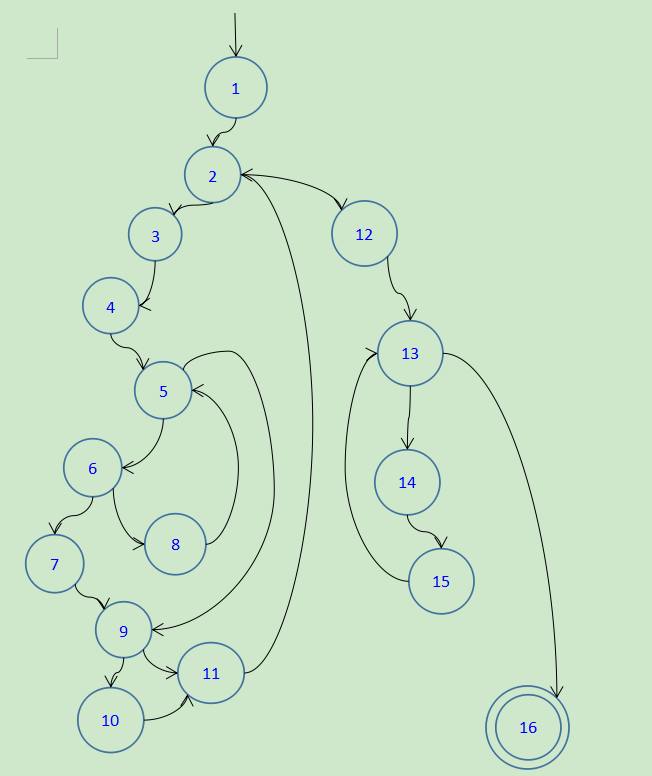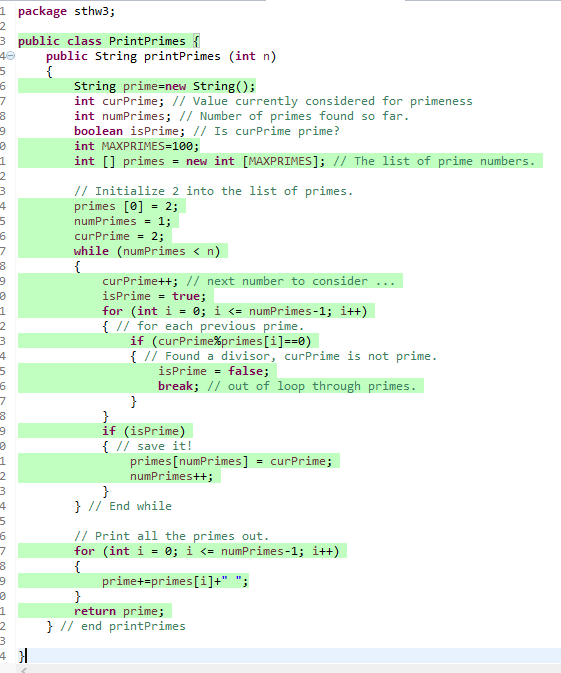软测hw3
一:(a)

对于图中表示的细节:
1:int curPrime....curPrime=2
2~3:numPrimes<n
3:curPrime++;isPrime=true;
4:int i=0
5~6:i<=numPrimes-1
6~7:curPrime%primes[i]==0(T)
6~8:curPrime%primes[i]==0(F)
7:isPrime=false;break;
8:i++
5~9:i>numPrimes-1
9~10:isPrime(T)
9~11:isPrime(F)
2~12:numPrimes>=n
12:int i=0
13~14:i<=numPrimes-1
14:system.out.println..
15:i++
13~16:i>numPrimes-1
(b) set MAXPRIMES=4, then t2 will get the resulting array bounds error
(c)n=1
(d)NC:TR={1,2,3,4,5,6,7,8,9,10,11,12,13,14,15,16}
EC:TR={(1,2),(2,3),(2,12),(3,4),(4,5),(5,6),(6,7),(6,8),(7,9),(8,5),(5,9),(9,10),(9,11),(10,11),(11,2),(12,13),(13,14),(13,16),(14,15),(15,13)}
PPC:{(1,2,3,4,5,6,8),(1,2,3,4,5,6,7,9,10,11),(1,2,3,4,5,6,7,9,11),(1,2,3,4,5,9,10,11),(1,2,3,4,5,9,11),(5,6,8,5),(6,8,5,6),(1,2,12,13,16),(1,2,12,13,14,15),{14,15,13,16),(13,14,15,13),(14,15,13,14),(15,13,14,15),(3,4,5,6,7,9,10,11,2,12,13,16),(3,4,5,6,7,9,10,11,2,12,13,14,15),(3,4,5,9,10,11,2,12,13,16),(3,4,5,6,7,9,11,2,12,13,14,15),(3,4,5,9,11,2,12,13,16),(3,4,5,9,10,11,2,12,13,14,15),(8,5,6,8),(6,8,5,9,10,11,2,12,13,14,15),(6,8,5,9,10,11,2,12,13,16),(6,8,5,9,11,2,12,13,14,15),(6,8,5,9,11,2,12,13,16),(8,5,6,7,9,10,11,2,12,13,14,15),(8,5,6,7,9,10,11,2,12,13,15),(8,5,6,7,9,11,2,12,13,14,15),(8,5,6,7,9,11,2,12,13,15),(2,3,4,5,6,7,9,10,11,2),(2,3,4,5,6,8,9,11,2),(2,3,4,5,9,10,11,2),(2,3,4,5,9,11,2)}
(e)[1,2,3,4,5,6,8,5,6,7,9,10,11,2,12,13,14,15,13,16]
(f)[1,2,3,4,5,6,8,5,6,7,9,10,11,2,12,13,14,15,13,16],[1,2,3,4,5,9,11,2,12,13,16]
二:基于Junit及Eclemma实现
被测试部分:
package sthw3;
public class PrintPrimes {
public String printPrimes (int n)
{
String prime=new String();
int curPrime; // Value currently considered for primeness
int numPrimes; // Number of primes found so far.
boolean isPrime; // Is curPrime prime?
int MAXPRIMES=100;
int [] primes = new int [MAXPRIMES]; // The list of prime numbers.
// Initialize 2 into the list of primes.
primes [0] = 2;
numPrimes = 1;
curPrime = 2;
while (numPrimes < n)
{
curPrime++; // next number to consider ...
isPrime = true;
for (int i = 0; i <= numPrimes-1; i++)
{ // for each previous prime.
if (curPrime%primes[i]==0)
{ // Found a divisor, curPrime is not prime.
isPrime = false;
break; // out of loop through primes.
}
}
if (isPrime)
{ // save it!
primes[numPrimes] = curPrime;
numPrimes++;
}
} // End while
// Print all the primes out.
for (int i = 0; i <= numPrimes-1; i++)
{
prime+=primes[i]+" ";
}
return prime;
} // end printPrimes
}
测试部分:
package sthw3;
import static org.junit.Assert.*;
import org.junit.Before;
import org.junit.Test;
public class PrintPrimestestTest {
private PrintPrimes print;
@Before
public void setup() throws Exception{
print=new PrintPrimes();
}
@Test
public void testPrintPrimes(){
assertEquals("2 3 5 7 11 ",print.printPrimes(5));
}
}






